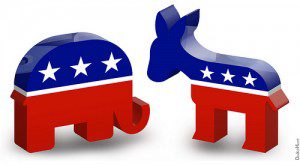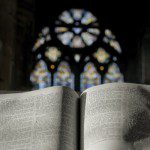When God Gets Political: Interrupted
I met a new friend the other day, who, upon finding out I was a pastor, asked me a question framed with a story. “What should pastors be saying about this election?,” he started. “I am so frustrated!,” he continued. “After church two Sundays ago I pulled my pastor aside during coffee hour and said I’d been surprised she wasn’t talking about the political situation in our country. I mean, not even a reference!’
“So I said to her, ‘Pastor, can you tell my how my faith might help me make sense of this unbelievable time in which we find ourselves in this country?’”
“But she just looked at me, shaking her head, and said: ‘Well, I guess all I can tell you is that you should pray about it.’”
My new friend looked at me, incredulous. “Can you believe that? Pray about it? Her answer made me despair for the future of the church,” he said. “Because if we’re not talking at church about how our faith informs our everyday lives, and especially this election cycle, then what is the point of church at all?”
Indeed.
In these next three weeks leading up to political conventions, our airwaves littered with the rhetoric of candidates and pundits, it’s an especially good time to think about what it means for our lives when God gets political. And don’t let anybody tell you that God doesn’t! Our lectionary passages over these next few weeks come from two ancient prophets, Amos and Hosea, two men tasked by God to remind the people that their faith has political ramifications; that God has some opinions about the state of our corporate life, and that God is not afraid to share them.
It would be difficult this morning to delve deeply into the words of the prophet Amos without some understanding of the political situation in Israel at the time Amos was bringing his message. About three hundred years before Amos showed up on the scene the people of Israel had begged God for a king so that they would be like the other nations around them. This whole king experiment started fairly well and perhaps had its highest point in the monarchy of Israel’s most famous king, David, but steadily went downhill after that until, at the end of kind Solomon’s reign, the nation broke into two. Guarded borders, separate monarchies, all of that. And you should know that the kings who ruled both Israel and Judah were, as a whole, inept. Some of them were downright corrupt. By the time Amos was called by God to prophesy, something was terribly wrong in the basic fabric of the society in which the people of God lived.
And so, Amos was asked by God to show up at the temple one day to report on a vision he’d had from God—to let the people know that God was not happy with the way things were going—not one bit—and that they’d better shape up, or God’s patience was bound to run out altogether. Unfamiliar with the work of a prophet? Old Testament scholar Walter Bruggemann describes it like this: prophets were called by God “to have an impact on persons, to impinge upon perception and awareness, to intrude upon public policy, and to evoke faithful and transformed behavior.” (Like Fire in the Bones, p. 6)
 In other words, when asked how to act upon the current political situation through the lens of one’s faith, a prophet would never say: “I guess all I can tell you is that you should pray about it.”
In other words, when asked how to act upon the current political situation through the lens of one’s faith, a prophet would never say: “I guess all I can tell you is that you should pray about it.”
Consider our prophet of the day today, Amos. Amos wasn’t your typical prophet, if there is such a thing. He was a fairly established herdsman and farmer who lived near the border of Judah and Israel. He was not a priest. He had no religious training. He was farmer, just a regular guy, out taking care of his business when he had a vision from the Lord, along with instructions for passing along the message.
Amos might have been a run of the mill guy, but there was no way you could live in the Israel/Judah society of the time and not be aware that something was wrong—really, really wrong. There were too many needy people; society was filled with extreme income disparity and the triumph of the wealthy and powerful, who “oppressed the poor and crushed the needy.” All of them were living in a society in which the very structures of their lives together created a class of people who didn’t have enough, who couldn’t eek out a living, not matter how hard they tried. While certain parts of society flourished, there were many among them who could barely hold up their heads. Things were bad.
So one day, this nice man Amos was out in the fields tending to his sycamore trees, when he suddenly got a vision from the Lord, who told him to take the message across the border from Judah into Bethel, a city in the far corner of Israel, and let the priest there know that God had some concerns.
I don’t know why Amos left his sycamore trees to go tell the priest what was what, but whatever the reason, off he went—just about 10 miles—across the border to speak to the priest. And this is what he said: “I saw the Lord, standing next to a wall, holding a plumb line in his hand. ‘Amos, what do you see?’ the Lord asked in my vision. ‘I see a plumb line,” Amos said. And then God said: ‘I am setting a plumb line in the midst of my people Israel.’”
And with that, God got political.
A plumb line, for those of us who are not carpenters, is a string with a weight on the end, held up next to a structure to gauge whether it’s standing up straight. A plumb line.
And so Amos continued with his prophecy, but as he spoke, the priest Amaziah interrupted.
First Amaziah said this: Hold on. I need to send a message to the King, the head political power broker. This vision you say you’ve had—it doesn’t fit well with the overall status quo. In fact, the things you’re saying—they are threatening, and the king is not going to be pleased. I’m going to need to let the king know I had nothing to do with this kind of talk at all!”
There’s no way the priest Amaziah did not see the poor, congregating at the gates of the temple, begging for an honest day’s work or just a crust of bread to survive. What he offered Amos was an interruption that failed to take responsibility for the moral rot of the society in which he served as a leader, a practiced distancing between his everyday life and the systemic failure he saw all around him.
But remember, God was getting political, and he was not about to be silenced. His prophet Amos continued. You might imagine Amos saying: the plumb line is hanging straight and true, but this wall you have built, this society you lead, is desperately crooked and fundamentally unsound. And you know was well as I do that there’s no fixing this without dismantling it altogether and starting over with a foundation that’s true: justice, mercy, humility.
But Amaziah interrupted again. “You need to get out of here. You don’t have any credibility—you’re not one of us, you don’t have the credentials of the religious crowd, we don’t have to listen to you.”
Well, by now you might imagine the newly minted prophet Amos a bit annoyed. He’d been busy tending his crops and herds when God asked him to speak up; he’d undertaken great physical risk to get to Amaziah; all he wanted to do was to get the message out and to, you know, do the job of a prophet: have an impact on persons, impinge upon perception and awareness, intrude upon public policy, and evoke faithful and transformed behavior—to speak to the situation of his society about which he could not stay silent any longer. Things were too bad; God’s call to him to speak up was too strong.
So Amos fires back at Amaziah: “You say I shouldn’t speak up, but the situation is so dire that if somebody doesn’t do something soon, that wall we’re building is going to come tumbling down, because God is watching what’s going on here, God is seriously not happy, and God has just gone and gotten all political. Listen up!”
It’s been thousands of years since Amos was busy dressing his sycamores when he got interrupted by God asking him to take a message to the people, but there are some things that haven’t changed very much at all, aren’t there? Here we are, going about our business, but it seems to me that God has been standing here for some time, holding a plumb line against the wall that is American society. And guess what? This wall we’ve built is desperately crooked. It’s leaning and unstable, it’s threatening to fall if somebody doesn’t get the message across loud enough and long enough to intrude upon public policy and to evoke faithful and transformed behavior. Something has got to change.
So, say that God has gone and gotten political. And say that God has just passed right on by the professional politicians who help construct our public policy and build our society that proclaims “freedom and justice for all,” and come straight to us.
Who, us?
Yes, us. And said: go and prophecy to the people. This is urgent! Tell them: the wholesale killing, public lynching, really, of black and brown people in our society must stop.
And the proliferation of guns in and among us has to end. Now.
And, most of all, the societal structures of white supremacy, deep income disparity, and a culture of fear that teaches us violence is the way we solve our problems—all of that: take it down. Take it all down and start again.
What would happen if we spoke up with God’s political message?
Well, I’ll tell you what would happen: we’d get interrupted, just like Amos. Powerful and influential people would jump right in and interrupt a prophecy like that with comebacks like:
“Well, he did have a criminal record.” or
“See! It’s the protestors causing the problems!” or
“Guns don’t kill people, people kill people!” or
“Why are you making this about race? Don’t you believe that #alllivesmatter?” or
“They’ve got it coming to them; they could have gone to college instead of selling cigarettes on the corner.” or
“The second amendment protects my right to bear arms. If people were armed, they could defend themselves…”
And you know as well as I do, that when the prophets find the courage to speak, that the interruptions will continue, talking louder and imposing discriminatory policy and passing out assault rifles and claiming superiority because of the color of my skin or the money in my bank account.
These interruptions will work to silence the voices of the prophets, to discredit their truth-telling, to advance the lie that the wall is straight and true and strong as can be. And, hey, let’s build another wall! A big wall! And let’s make Mexico pay for it.
But that won’t work. Because when the voices are silent and dust settles, you and I, we will still see a vision, like Amos, a vision of God, getting all political: standing next to a wall, and holding up a plumb line. Maybe God will say: “See, I am setting a plumb line in the midst of my people…,” or maybe God won’t have to say anything at all—it will be just that obvious.
Because it always is…when God gets political.
Perhaps you have felt like me this week: discouraged, grief-stricken, void of any hope whatsoever. It surely would not take much more than glancing at the newspaper to feel that way. But if you’re not there, you have only take a look at the video of Phliando Castille’s death and the little four year old in the backseat when he was murdered at a routine traffic stop. Hear her voice comforting her mother: “It’s ok, Mommy, I’m right here with you.”
Friends, this wall is leaning. It’s teetering precariously. And if the voices of prophets don’t ring out in every corner of this nation, then that wall we’re building is going to come tumbling down. Because God is watching what’s going on here, God is seriously not happy, and God has just gone and gotten all political.
You. You and you and you and me and you. All of us. We may have been busy tending our herds, or whatever the modern day equivalent of “going about your business” might be, but God has stopped us in our tracks to say it’s time for us to speak up, to say that white supremacy has too long held sway in this country; to say that semi-automatic weapons for sale at Walmart and regular drills in case of gunmen held in elementary schools and yet another vigil for victims of gun violence—all of those things are not okay; to say that a routine traffic stop cannot be a death sentence; to declare that the right to assemble and protest is important, and so is the safety the police officers who protect those protestors.
We can do better. God is calling us to DO BETTER. So, step up. All of you. Become the prophets that God is calling you to be. Raise your voice loud. Tell the truth clearly. Ignore the interruptions. Because when God gets political, he’s serious. He’ll stand next to the walls we build and hold out the plumb line of righteousness, and he will keep calling and sending prophets, maybe even you and me, to call for divine justice to roll down like waters and righteousness like an ever-flowing stream. That divine march toward justice is relentless and strong. And it will not tolerate interruptions.
Amen.












